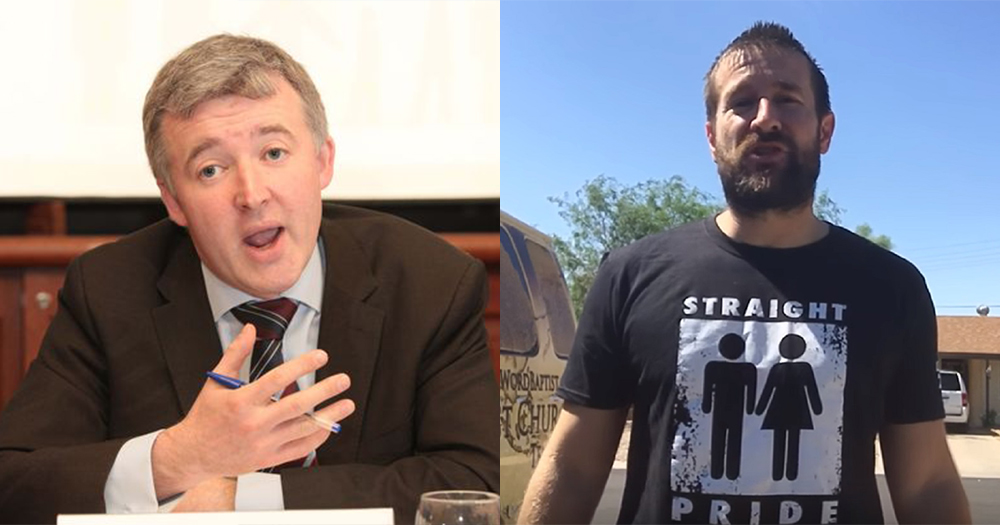The Irish Council for Civil Liberties has requested the Minister for Justice to explain why he used executive powers to ban US pastor Steven Anderson from visiting Ireland to preach.
Pastor Steven Anderson has banned following Justice Minister Charlie Flanagan’s signing of an exclusion order.
Anderson is the first person to be banned from Ireland in the 20 years since the exclusion power came into law.
Victory in #Ireland! Anti-gay U.S. pastor Steven Anderson has been banned from Ireland after more than 25,000 All Out members asked the Irish government to deny him entry to the country. pic.twitter.com/gmNUzpeDOo
— All Out (@AllOut) May 13, 2019
Upon signing the banning order, which came into immediate effect under Section 4 of the 1999 Immigration Act, Minister Flanagan stated, “I have signed the exclusion order under my executive powers in the interests of public policy.”
Speaking to RTÉ, Liam Herrick, Executive Director of the Irish Council of Civil Liberties, said this seems to be the exercise of a very exceptional power, and that they need more information about how the decision was made.
“The law requires that a decision of this type must be necessary and must be in furtherance of public policy,” he said.
“The standard of necessary is a very high threshold, so we need to know why this was necessary or the only way of dealing with this particular difficulty, and we also need to know what is the public policy that requires this step.
“Because this decision affects fundamental rights in such an important way, we believe there’s a duty to give reasons in this case too.”
He added that there is a broader question about what Ireland and what Anderson is trying to achieve.
“Sometimes being banned serves their political ends. Sometimes confronting hate speech and messaging of this type directly, protesting and ridiculing what’s being said can actually be more effective in the longer term,” he said.
“The use of exceptional legal powers needs to be very tightly defined and tightly explained and I think we need more information from the Minister on this”.
Herrick said that there are weaknesses in other areas of our laws which he deems more appropriate in dealing with such issues.
“Ultimately, incitement and public order offences coming from speech are policing matters that are appropriately dealt with by our police. We haven’t felt the recourse to take exceptional steps up to now, so we have to question why it is necessary on this occasion,” he said.
A spokesperson for Minister Flanagan said that he would not be commenting further except to confirm that he signed the order to excluded Mr Anderson “with immediate effect in the interest of public policy”.
The religious fundamentalist, who called for the death penalty for LGBT+ people, was due to give a sermon in Dublin on May 26 in an unknown location. A petition organised by All Out and LGBT Ireland partnered with GCN asked for Anderson to be banned garnered 25,000 signatures.
"In the absence of [effective hate speech legislation], we called for this ban, but going forward we'd like to see very robust legislation in place so people know what the parameters are around what people can say and what is unacceptable and dangerous" https://t.co/nqAvfg1IH8
— LGBT Ireland (@LGBT_ie) May 14, 2019
CEO of LGBT Ireland Paula Fagan, who is working with the Department of Justice on an LGBT+ inclusion strategy, said they were relieved by Mr Flanagan’s decision, but has called for new legislation around hate speech and hate crimes in Ireland.
“Unfortunately we don’t have very effective hate speech legislation in Ireland, and we don’t have any legislation or any law in Ireland around hate crime,” she said.
“In the absence of those, we called for this ban, but going forward we’d like to see very robust legislation in place so people know what the parameters are around what people can say and what is unacceptable and dangerous in terms of speech”.
© 2019 GCN (Gay Community News). All rights reserved.
Support GCN
GCN is a free, vital resource for Ireland’s LGBTQ+ community since 1988.
GCN is a trading name of National LGBT Federation CLG, a registered charity - Charity Number: 20034580.
GCN relies on the generous support of the community and allies to sustain the crucial work that we do. Producing GCN is costly, and, in an industry which has been hugely impacted by rising costs, we need your support to help sustain and grow this vital resource.
Supporting GCN for as little as €1.99 per month will help us continue our work as Ireland’s free, independent LGBTQ+ media.
